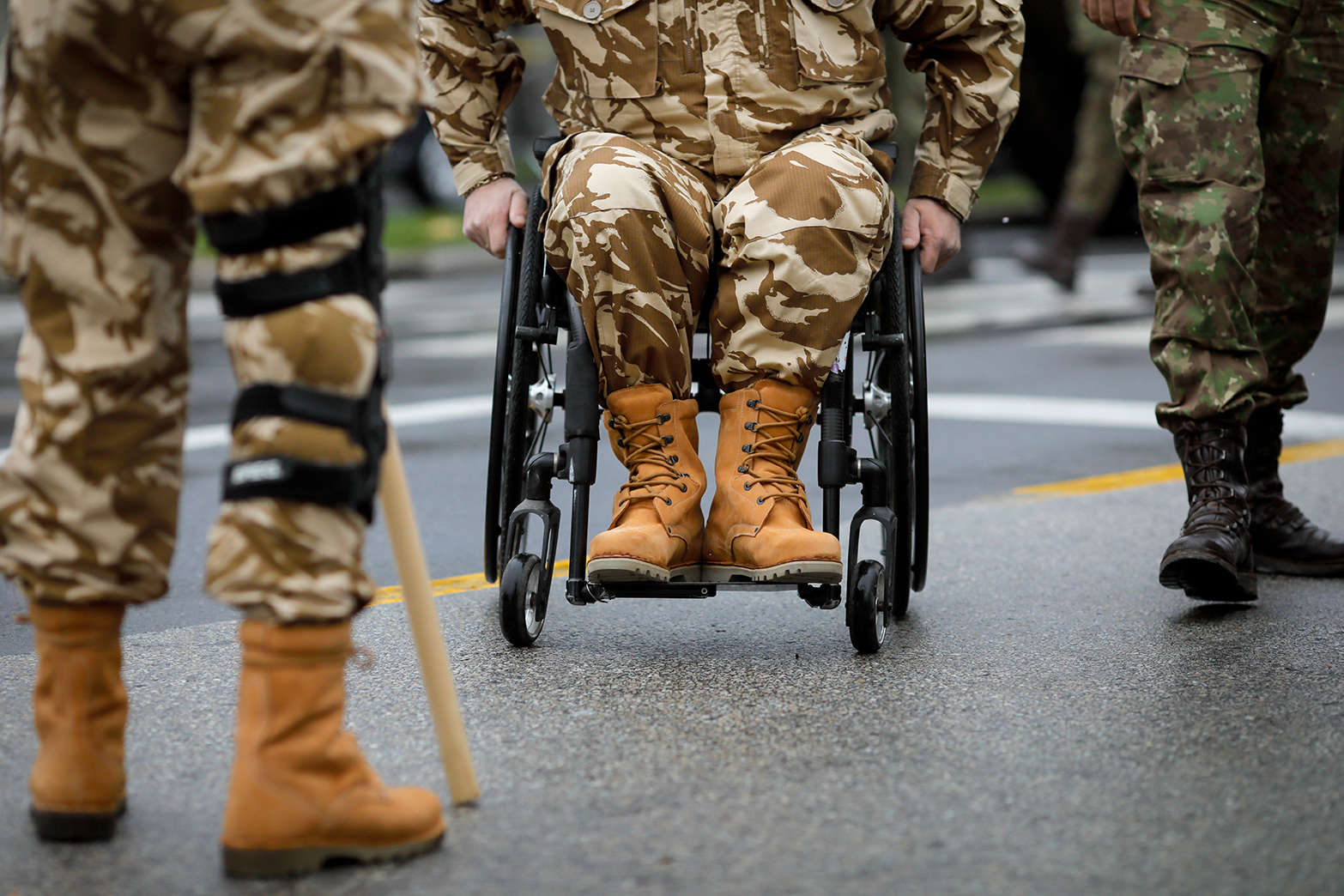VA disability benefits, private disability insurance, workers’ compensation and Social Security disability benefits may be available to help ease the financial burden for disabled veterans.
Military life isn’t easy. Those in the military are asked to do things not asked of others: they are required to leave their loved ones and homes, and put their lives at risk to serve our country.
Added to this, veterans are often faced with an injury or illness related to their service – the U.S. Census Bureau estimates that nearly four billion veterans report they suffer from some sort of disability – which can leave millions around the country struggling to make ends meet.
The good news? There is help out there for veterans who are either suffering from physical or mental disabilities as a consequence of their military service, or who go on to develop disabling conditions upon their return to civilian life. The key? You do need to do your homework.
Fortunately for you, Sampson Dunlap LLP is here to break down the various disability benefits that veterans may be entitled to. Let’s get started
”“People are relying on a failing system and it often feels like a stand-off. Thankfully it was worth fighting on.”

VA disability benefits
For veterans with disabilities and in need of financial aid, the first consideration should be applying for VA disability benefits – aka monthly tax-free disability compensation paid to veterans who are at least 10% disabled due to diseases, injuries or illnesses that were incurred or aggravated during their time in the military.
Medical conditions which qualify for VA disability benefits range from physical disabilities such as injury or a chronic illness to mental health conditions including post-traumatic stress disorder (PTSD).
In August 2021, the VA added three presumptive conditions – asthma, rhinitis and sinusitis – to its list of qualifying conditions in recognition of the fact that exposure to particulate matter (a mixture of tiny particles and droplets such as smoke, soot, dust, or dirt) while on service can cause respiratory conditions.
Eligibility is determined using a system of disability ratings based on medical evidence of a condition, and compensation is then linked to the rating associated with the disability.
As of December 2021, VA disability compensation payments ranged from $152.14 per month for a 10% disability to $3,332.06 for a 100% disability.
Veterans with certain severe disabilities may also be eligible for additional special monthly compensation (SMC).
To apply for VA disability benefits, you must submit all relevant evidence and information, including the following as part of your application process:
- Discharge or separation papers (DD214 or equivalent)
- Service Treatment Records (if in your possession
- Medical evidence
Social Security Disability Insurance (SSDI)
In addition to receiving disability benefits from the VA, veterans are also eligible for disability benefits from the Social Security Administration (SSA).
But just because you have been granted VA disability benefits, it doesn’t necessarily follow that you’ll be entitled to Social Security Disability Benefits.

That’s because, to be eligible for Social Security Disability Insurance (SSDI) –you must meet the SSA’s definition of disability. And the requirements to qualify are rigorous.
While the VA recognises any veteran who became disabled during or as a result of their military service, the SSA determines eligibility based on the severity of the claimants disability together with their work history.
Translation? Veterans with disabilities must have spent a certain amount of time in employment, and paid FICA payroll taxes, in order to qualify.
And, unlike VA disability benefits, SSDI eligibility is also based on whether an applicant’s condition is severe enough to prevent them from working entirely. (By contrast VA disability benefit assessed disabilities on a percentage scale, assigning different percentages to various injuries.)
For 2022, the SSA has estimated that the average monthly SSDI benefit is $1,358 per person – extra income that can make a big difference to your quality of life.
”Stop struggling with a system that does not care. We are here to support you. That is why you do not pay for our services until we win. Don't wait any longer. Take control of your life and speak to our friendly team today.
Are there benefits to applying and qualifying for both VA disability compensation and SSDI?
Absolutely. Firstly, qualifying for VA disability benefits can help fast-track an SSDI application thanks to the Social Security’s Wounded Warrior program.
Secondly, VA disability benefits don’t affect your SSDI benefits and vice versa: each program will pay veterans who meet the criteria the full amount they are entitled to.
By contrast workers’ compensation and some other types of public disability benefits can trigger what the SSA calls an “offset”, which reduces your Social Security payments.
What’s more, veterans permitted SSDI and VA disability benefits can receive medical coverage through both. This means that veterans will receive Medicare (although there is an annoying 24-month waiting period before it starts) through the SSDI program – while simultaneously receiving medical coverage under the VA’s Tricare program.
”Military life isn’t easy. Soldiers are asked to do things not asked of others: Leave their loved ones, homes, and put their lives at risk to serve our country.

Private disability insurance
While VA disability benefits and SSDI are valuable resources, it is important to stress that they aren’t the only financial assistance options available to veterans with disabilities.
Approximately half of mid- and large-sized employers offer some kind of disability insurance for staff who can’t work because of an injury or illness that is not related to their job.
Short-term policies may pay for up to two years and typically replace 60% to 70% of your base salary.
Meanwhile long-term policies which, as a rule of a thumb kick in after three to six months, potentially pay benefits for a few years (or until the disability ends) and replace 40% to 60% of your income.
Our message? Disability insurance is a critical safety-net benefit worth your attention – unless you have a stash of cash to cover your medical bills and lost wages and income.
If you aren’t able to get insurance through your employer, there is also the option to buy your own individual disability insurance through any insurance provider. One caveat: these policies tend to be expensive. Employer provider options are invariably far more reasonably priced.
Workers’ compensation insurance
Many people confuse disability insurance with workers’ compensation, and understandably so. Both programs provide financial help to employees when they are unable to work because of an illness/injury, but there are a couple of key differences.
While disability insurance is for injuries and illnesses that occur outside of the workplace, workers’ compensation is for illnesses or injuries that happened on the job.
Workers’ compensation – which pays (partial) wages, medical bills and occasionally covers retraining costs – is also provided by an employer at no cost to employees, and is required by law in most states.
Most workers typically start receiving workers’ compensation benefits soon after their injuries – meaning you can receive workers’ compensation while your other applications, such as SSDI, are being processed and reviewed.
Keep in mind, however, that the Social Security Administration (SSA) may adjust or offset your SSDI benefits based on how much you receive from workers compensation.
As a rule of thumb, the amount you collect from both workers’ compensation and disability benefits can’t be more than 80% of your previous income.
We recommend speaking with an experienced disability attorney about your situation before progressing with your applications.
Where can I get help?
Dealing with a disability is hard enough as it is. Factor in an array of complex and time-consuming disability claims processes, and it’s easy to feel overwhelmed.
Sampson Dunlap understands this. That’s why we have a dedicated and experienced team whose overarching goal is to help make life easier for veterans with disabilities who have risked their lives, health and welfare to serve our country.
While we can never really repay the debt owed to our disabled veterans, it’s a small comfort that we can at least make them aware of the support they can access and help our heroes – who have been injured in the line of duty or suffered a disabling condition on their return to civilian life – fight to secure the financial aid they deserve.
Stop struggling with a system that does not care. We are here to support you. That is why you do not pay for our services until we win. Don’t wait any longer. Take control of your life and speak to our friendly team today.


